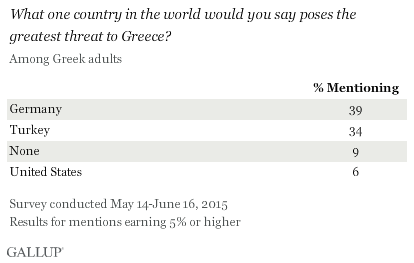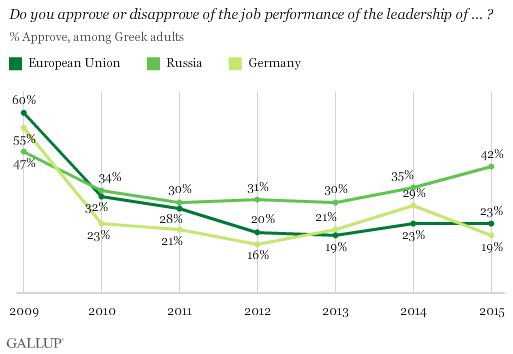Story Highlights
- Turkey second-biggest threat
- Fewer than one in five approve of Germany's leadership
- Greeks' approval of Russia's leadership grows
WASHINGTON, D.C. -- Before Germany joined other eurozone countries in approving Greece's third bailout package on Wednesday, a Gallup poll in Greece showed Greeks were most likely to see Germany as the one country that poses the biggest threat to them. Nearly four in 10 Greeks polled before the snap referendum was called in July named Germany as the biggest threat to Greece. This notably ranks it slightly higher than Turkey, which shares a long, hostile history with its neighbor.

These results at least partly reflect Greeks' vitriol ahead of the vote in July in which they resoundingly rejected the terms of extending the country's previous bailout. Though Germany has not been the only eurozone country to press Greece for austerity measures in exchange for rescuing its economy, it has been taking most of the blame for them with the public.
Greeks have not always been this sour on Germany. In 2009 before the debt crisis started in Greece, the majority of Greeks (55%) approved of Germany's leadership. However, their approval dropped precipitously after the first bailout in 2010, and the 19% who currently approve is on the lower end of ratings since then. Greeks similarly express little love for the European Union, but they are slightly more approving of the EU's leadership (23%) than that of Germany individually. Approval of U.S. leadership is at about the same level (28%).

Yet, Greeks do not hold the leadership of all countries in such similarly low esteem. After the Syriza party's sweeping victory in Greece earlier this year, many observers were watching whether the new government would pivot more toward Russia or the EU. Greeks, who were already more positive toward Russia to begin with, are even more so in 2015, with 42% approving of Russia's leadership. This is up from 35% in 2014 and is now about twice as high as their ratings of Germany and the EU.
Implications
Greeks' rejection in July of the terms of extending Greece's previous bailout prompted questions about whether the country would leave the eurozone. But after much wrangling, Greek lawmakers contentiously agreed to the terms of what will be their third bailout in five years, and it looks as if they will stay in the zone at least in the near future.
Eurozone finance ministers approved the package Wednesday evening, and the first of the funds started to flow into Greece on Thursday. It is uncertain whether this might change Greek perceptions of Germany, but the bigger question is whether all eurozone countries will find a way to work together, and to stay together.
Historical data are available in Gallup Analytics.
Survey Methods
Results are based on face to face interviews with 1,000 adults, aged 15 and older, conducted May 14-June 16, 2015, in Greece. For results based on the total sample of national adults, the margin of sampling error is ±3.7 percentage points at the 95% confidence level. All reported margins of sampling error include computed design effects for weighting.
For more complete methodology and specific survey dates, please review Gallup's Country Data Set details.
Learn more about how the Gallup World Poll works.
